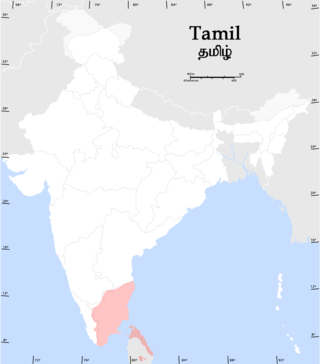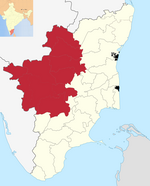Kongu Tamil
| Kongu Tamil | |
|---|---|
| கொங்கு தமிழ் | |
| Pronunciation | Koṅku Tamil |
| Native to | West part of Tamil Nadu and some parts of Karnataka, Kerala |
| Region | Kongu Nadu |
| Ethnicity | Kongu Vellalar |
Native speakers | (undated figure of ~20 million [citation needed]) |
Language family | Dravidian
|
Writing system | Tamil script |
| Official status | |
Official language in |  India (Tamil Nadu) India (Tamil Nadu) |
| Language codes | |
| ISO 639-3 | – |
| Glottolog | None |
 Distribution of native Tamil speakers in India and Sri Lanka | |

Kongu Tamil or Kovai Tamil is the dialect of Tamil language that is spoken by the people in Kongu Nadu, which is the western region of Tamil Nadu. It is originally known as "Kangee"`[1] or "Kongalam"[2] or "Kongappechu or Kongu bashai or Coimbatore Tamil".
Variations
The speciality of Kongu Tamil is the use of the alveolar ற - Tra/Dra (as in the English word track) instead of retroflex T/D (ட) of standard Tamil. For example, 'ennuDaiya' (mine) of standard Tamil is pronounced enRa in the Kongu dialect. However, only Coimbatore district people use this.
Additionally the use of guttural nasal (ங்) that sounds "ng" as in the English word Gang, is more prevalent in Kongu Tamil, leading to situations where the grammar of Kongu Tamil would not fit into the grammar of standard Tamil. One of the examples is the use of ங் to end a word like வாங் "vaang" or வாஙொ "vango" means 'come' expressed in a respectful tone, which in Standard Indian Vernacular Tamil would be வாங்க "vaanga". Both of these are stereotyping Kongalam with regional, professional variations.[3][4]
Kongu Tamil also uses certain Tamil words that are archaic to Kongu region and are not used in other dialects of modern Tamil.[5][6]
See also
- Kongu Nadu, region in South India
- Kongu Vellalar, community in South India
- Coimbatore, metropolis in Tamil Nadu, India
References
- ^ Silva, Severine (1963). Toponomy of Canara. p. 34.
In the southern part of Mysore the Tamil language is at this day named the Kangee, from being best known to them as the language of the people of Kangiam
- ^ F. Poezold, William Simpson (1809). Tamil̲umaiṅakilēcumāyirukakir̲a akarāti. Oxford University.
- ^ Team, SimpliCity News (2020-06-21). "Remembering the Dictionary of Kongu Thamizh". simplicity.in. Retrieved 2021-07-12.
- ^ Kongu Tamil, Tamil dialects (June 20, 2021). "Kongu Tamil dialects" (PDF). Google Scholar. Archived from the original on 12 July 2021. Retrieved 20 June 2021.
{{cite web}}: CS1 maint: bot: original URL status unknown (link) - ^ Krishnamachari, Suganthy (2017-10-12). "On how Kongu Nadu was a Jain bastion". The Hindu. ISSN 0971-751X. Retrieved 2021-07-12.
- ^ Kongu Tamil dialect, Anthology (20 June 2021). "Kongu Nadu Anthology" (PDF). Google Scholar. Retrieved 10 June 2021.
- v
- t
- e
| Indian | |
|---|---|
| Sri Lankan | |
| Sociolects |
| Classics | |
|---|---|
| Devotional literature | |
| Poetry | |
| Grammars and dictionaries | |
| History | |
| Mathematics and natural science |
other languages
grammar
- ISO
- Moḻi
 | This Dravidian languages-related article is a stub. You can help Wikipedia by expanding it. |
- v
- t
- e











